The Nominated Film You Might Have Missed: GOOD NIGHT, AND GOOD LUCK
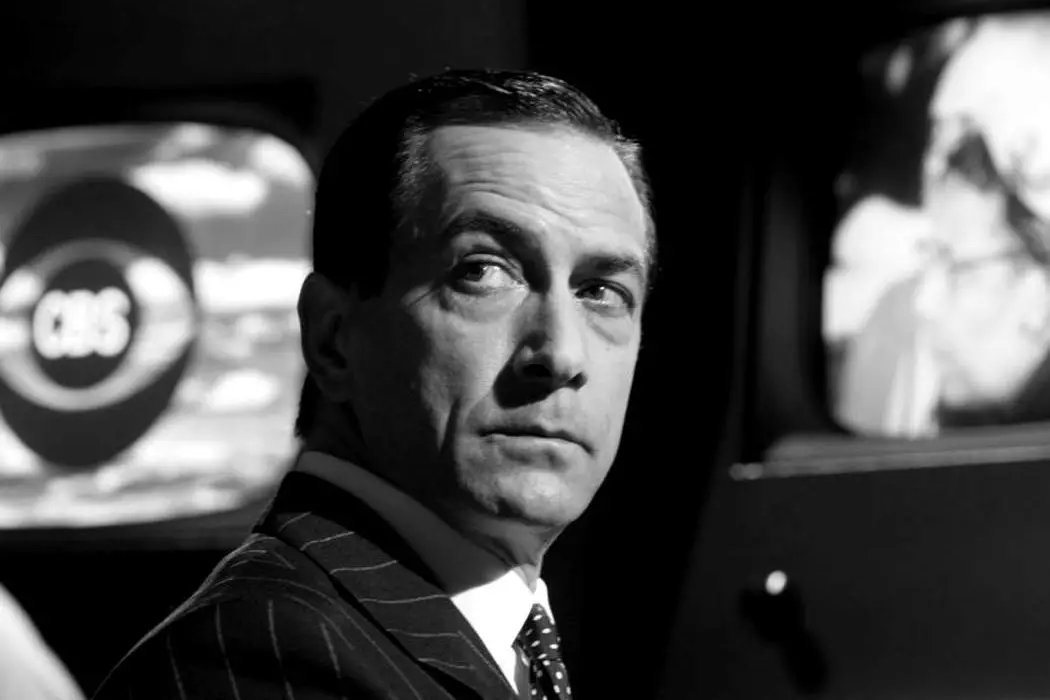
Stephanie Archer is 39 year old film fanatic living in…
Every year, between five to ten movies are bestowed the honor of being nominated by the Academy of Arts and Sciences. Many of these films will have already had various successes throughout the year – good festival attendance, box office success and the reception of other prestigious awards. Yet, only one of them ends their evening being declared the best of the best.
Each month, I select one of these films that, while honored with a nomination, did not achieve the highest recognition – a film for your reconsideration. Bringing them back into the light and into the minds of viewers gives them a chance to shine once again and reach a new group of people who may never have considered the film previously. This month, I have selected the compelling story of a modern day David who was unafraid to fight the giant Goliath to correct an injustice and become the catalyst to end one of the largest political witch hunts that followed World Ward II – Good Night, and Good Luck.
Nominated for Best Picture during the 2006 Academy Awards, this was the only film in black and white in contention for the golden statue – a nostalgic representation of the classic films that once dominated theaters and award shows alike. Director and writer George Clooney made the brilliant decision to film in this nature as it mimicked the time period of the film itself – early to late 1950s America, when the era of radio was ending and television was still in its early infancy. Yet, there is a deeper meaning in his decision. During this time, a political witch hunt for communists was under way, and the fear of Russians and Communism throughout the country was a dark time within American history.
Having someone accuse you of being – or sympathizing with – a communist was enough to blacklist you and have you fall under investigation, especially if you had a position in the government or its military personnel. At this time, hearsay was enough evidence to condemn. Yet, while many would fight against the injustice that would ensue due to this fear and the leadership of Senator McCarthy, a journalist named Edward Murrow was unafraid to embrace the newest invention of television to bring this injustice front and center across the country.
Through this man’s bravery, an injustice within the nation was brought into the homes of Americans through their television sets – one of the early indicators of the power of television. Furthermore, the reinstatement of Milo Radulovich and Congress’ investigation into the legality and dealings of McCarthy was further proof of the power of journalists to make a change for their country.
Good Night, And Good Luck
Good Night, and Good Luck opens at a festive honorary celebration to recognize the accomplishments of broadcast journalist Edward R. Murrow (David Strathairn). For years, with the support of his editorial team, Murrow fought against a variety of injustices throughout the country – most notably his public feud with Senator McCarthy and his communist witch hunt. This notorious feud is the focus of this film.
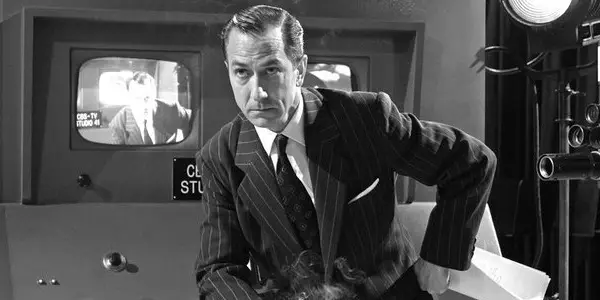
A few years earlier, while in a meeting to discuss upcoming news topics, Murrow brings a news clipping to his producer Fred Friendly (George Clooney) about a young lieutenant named Milo Radulovich who was discredited and removed from the Air Force. The only reason provided was his risk to national security.
The Air Force had uncovered information regarding his father’s subscription to a Serbian newspaper and that his sister was a communist sympathizer. Radulovich had been given a choice: either denounce his family as communists or he would be excused from his service. Seeing the injustice of the government, Senator McCarthy and the US military, Murrow defends the young soldier who has shown nothing but the utmost loyalty to his country. Yet, while it was an injustice that Murrow was trying to correct, this story was also the poking stick Murrow used “to see what happens,” while choosing a side to defend.
Murrow and his team pushed on in their fight to defend not only this soldier, but these who had fallen victim to the communist witch hunt – many whose names are tarnished solely on the basis of hearsay. Through carefully crafted journalism and an understanding of the responsibility of the news and television, Murrow and his team deliver a striking blow that becomes the start of the end of this modern day witch hunt.
The Witch Hunt of the 1950s
Often times this period in American history is referred to as the Communist Witch Hunt – many of those accused based on hearsay collected through sworn testimony. It is an example of history repeating itself. Like McCarthy’s exploitation of an already existent fear of communism, the fear of witches was exploited in the 1700s in Salem, MA. When a young woman was unable to get what she wanted from her lover, she accused his wife of being a witch. With a town consumed by fear, and the human fault of exploitation freely in the hands of others, many would be accused as witches and hung by the neck till dead. They, too, were convicted on hearsay – damning words with no evidence to prove them true.
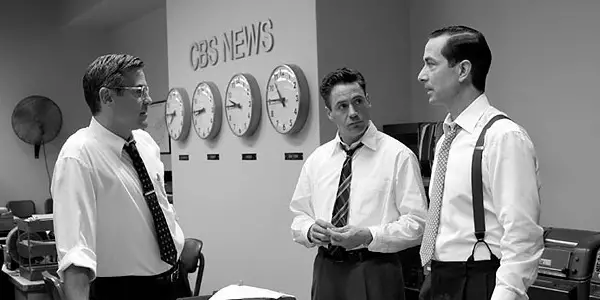
Clooney utilizes archive footage from CBS Studios and the special committee proceedings to accurately convey the injustice that ran unchecked for years. Milo Radulovich’s interview explaining why he could not denounce his family and what had happened to him is used in the beginning, showing firsthand the damage this witch hunt caused.
Later on in Good Night, and Good Luck, archive footage is also used of a filmed hearing for a Pentagon worker named Annie Lee Moss. She had been accused as communist strictly because someone had seen a name on a list that was identical to hers. With no other evidence, Annie was brought before the hearing committee to answer for her possible crime against her country.
There were many aspects of this footage that led Murrow to showcase it, and George Clooney to include it within the film. One was the absence of Senator McCarthy during the proceedings. While he was there at the initial start, he excused himself from the panel of inquisitors because he has other things to attend to. This was proof of the senator’s lack of devotion to his own manhunt – and that this woman was not worthy of his time and thus not an important factor to the hunt.
What is most striking about this archived footage, however, was during the few moments that the senator was actually there, Annie Lee Moss’ lawyer tried to represent his client and address the panel. The lawyer is immediately shut down by Senator McCarthy saying “I will not hear from counsel – if you speak, it will be with your client.” Not only is this woman denied a fair trial, as well as proper evidence for suspicion and questioning, she has just been denied the right to legal counsel and representation. Watching this film in present times, I found myself drawing up similarities between this iteration (or lack thereof) and the lack of allowed representation for accused women in Hulu’s The Handmaid’s Tale.
Good Night, and Good Luck is an important film that, as long as we continue to repeat history, will stand the test of time. The fear of terrorism gave politicians the power following the reprehensible acts of September 11th to begin a sort of terrorist witch hunt. While investigations through special committees were not a publicized act and accused individuals were not hung/burned at the stake, the Patriot Act allowed people suspected of terrorism based on hearsay or family relation to be deported, monitored unconstitutionally and their lives limited (no fly list).
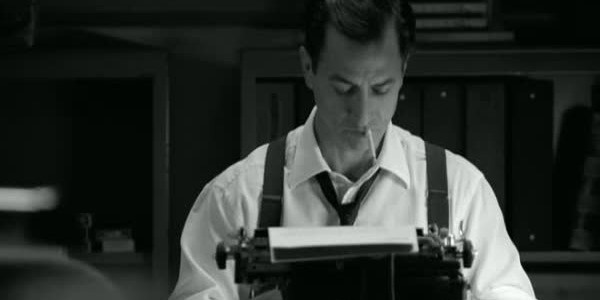
In present times, once again we find a political leader utilizing a fear already in place within the country. With the still present fear of terrorism expanded to immigration, President Donald Trump has been able to exploit this fear to pass laws preventing individuals from various Middle Eastern and Muslim countries from flying into the country.
“Our history will be what we make of it” is spoken in the beginning of the film. It is a foreshadowing not only for the success this reporting team finds in their fight against the senator, but also a warning. This repetition throughout history is what we make of it. We cannot blame it on an individual but on ourselves. We have the power to make a change as Murrow and his team did – we just have to be brave enough to try.
“The fault dear Brutus is not in our stars, but in ourselves…” – William Shakespeare, Julius Caesar
The Responsibility of Journalists
One of the biggest takeaways that is examined in this film is the responsibility of journalists. At the the time of Senator McCarthy and the witch hunt for communists, it was journalists that were at the front lines, informing the American people of the injustice and unconstitutional treatment of its citizens.
With the introduction of television, the responsibility of the journalist broadened. No longer did people hang on every word that poured through the speakers of the radio, but instead images could be used to accompany each spoken word. Pictures and video would bring a new element to reporting that would enhance its effects and further illuminate and corroborate news stories.
Yet, with this new introduction, there is always a possibility of allowing these devices to simply become “a box of wires and flickering lights,” as Murrow would state in his honorary speech, and this responsibility of making it an educational and informative tool falls on the reporters. It is an instrument for good. Without journalists utilizing its awe-inspiring power, televisions simply become a dumb insulating box.
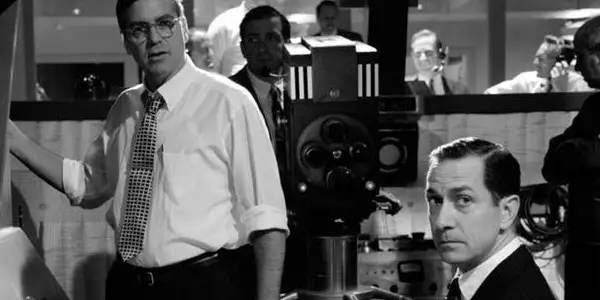
This responsibility of journalists, though, is ever so slightly contrasted throughout the entire film through the advertisers that they give airtime to. Commercials – most notably for cigarettes – shown throughout have been proven to be dangerous to the public, yet were advertised as harmless – a concept that can only be truly understood in present times. Advertisers paid for their TV spot, the bigwigs of the studios played them, taking it on faith that the marketing would help the capitalism of the nation, without looking into the legality of the message they were sending to the American people.
David Strathairn does a brilliant job of conveying this belief and upholding it himself within his character throughout the entire film. There is an aura of dedication, determination and good ol’ American resilience that shines through every element of his performance – and not just in the words spoken. The body language throughout the film mimics the words he speaks, his body never faltering to support his spoken beliefs and accusations. Murrow is unflinching in his mission, and Strathairn successfully brings this interpretation to life on screen.
TV vs. Radio
Throughout Good Night, and Good Luck, during moments of transitions in mood and emotion, songs are utilized within the film. But they are not overlaid as characters move quietly about, but instead as scenes of a woman in a recording studio typically used for radio broadcasting. Clooney’s choice of visual is highly impactful as it is a brilliant contrast to a time when one medium was on its way out and another was taking ultimate control.
During a part of Murrow’s speech, the film transitions to the past – to the moment his feud began with Senator McCarthy. As employees enter the CBS Studios building, a woman singing “TV is the thing this year” can be heard – scenes of the women in the recording studio following shortly after. Quite literally, viewers are being told that one of the main points of this film, beyond communism and journalistic responsibility, is the driving force of television and the impact it is having.
Another transitional recording part way through Good Night, and Good Luck, as the heat against the communist witch hunt is building from Murrow and his team, again shows the same woman, this time singing “I set my spies on you.” Around this time in the film, Senator McCarthy had accepted Murrow’s offer to defend himself. Speaking to the American people through the CBS program, McCarthy defends his actions and accuses Murrow of being a communist sympathizer himself. Once again, the contrasting radio representation accurately captures the mood of the film and the current state of mind that each of our characters are in. Knowing that challenging McCarty would bring the firing squad, in this moment it has come to full fruition.
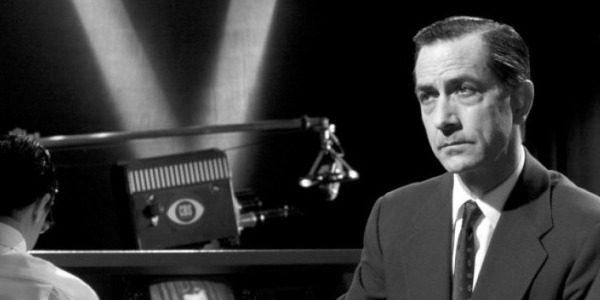
Utilization of song is not only there to represent a medium, but also to show the extreme benefits of television vs. radio. The songs represent the relaying of emotions audibly through a radio, while coupling it with visuals shows how TV is able to do both. Television was a newer form of communication and entertainment during the time of Senator McCarthy and Edward Murrow, redefining the role of journalists everywhere. Murrow at one point in the film talks about the responsibility that these flickering boxes now demanded of reporters and the opportunities they offered to the public. It is a new technology with a vast realm of possibilities – both good and bad – that stretches beyond the power of radio.
Conclusion
Good Night, and Good Luck not only examines a dark moment within American history, but also a historical component that finds repetition throughout history in various forms. The communist witch hunt of the 1950s was a time of perpetual fear and injustice passed out through the United States government. Yet, when one man and his team decided to fight against the power, they become a reminder of the ability of the few to make a difference.
Yet, it is not only the actions of Senator McCarthy that are magnified and examined, but also the responsibility of journalists to the public, and the extension of that responsibility with the introduction of the newest advancement in technology – television. The role of journalists was expanded, and the ability to transform this new “box of flickering lights” into a tool for education and information became a vital part of the future.
This was a brilliant film written and directed by George Clooney, and brought to life by a stellar cast. Presently, this film speaks volumes as it is applicable to present times – and most likely the future. Through understanding our mistakes, listening to the words of others and understanding that we each play a role in the creation of history, this film is sure to become a resounding classic of the ages.
“Good Night, and Good Luck.”
Does content like this matter to you?
Become a Member and support film journalism. Unlock access to all of Film Inquiry`s great articles. Join a community of like-minded readers who are passionate about cinema - get access to our private members Network, give back to independent filmmakers, and more.













